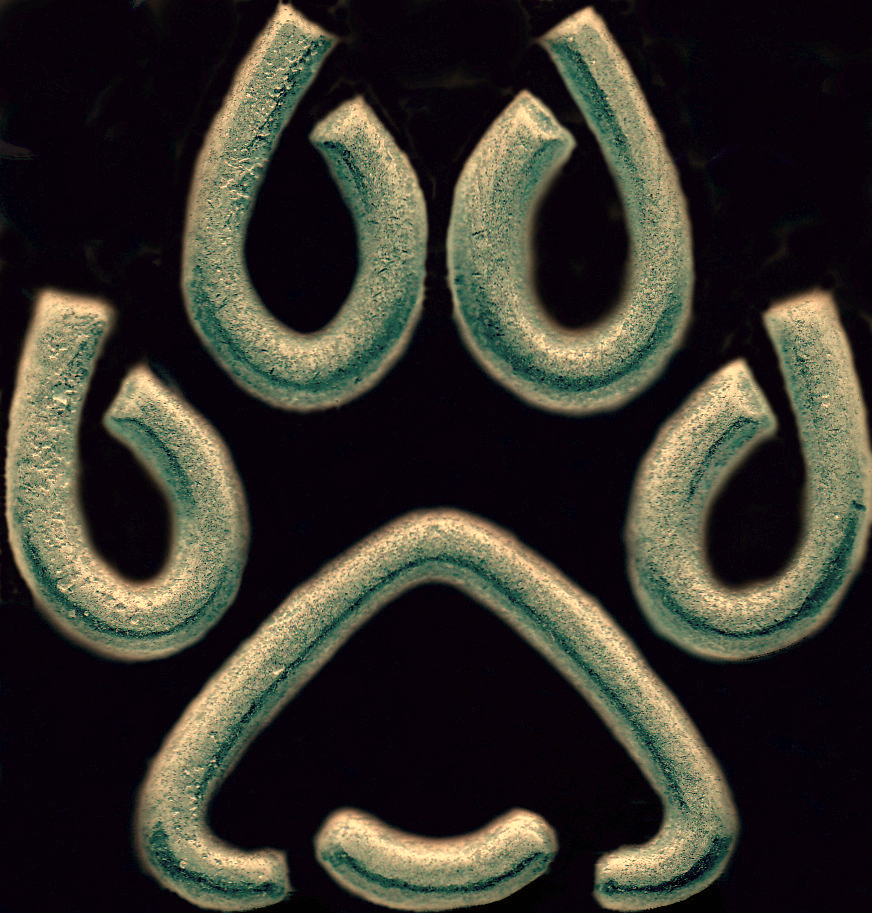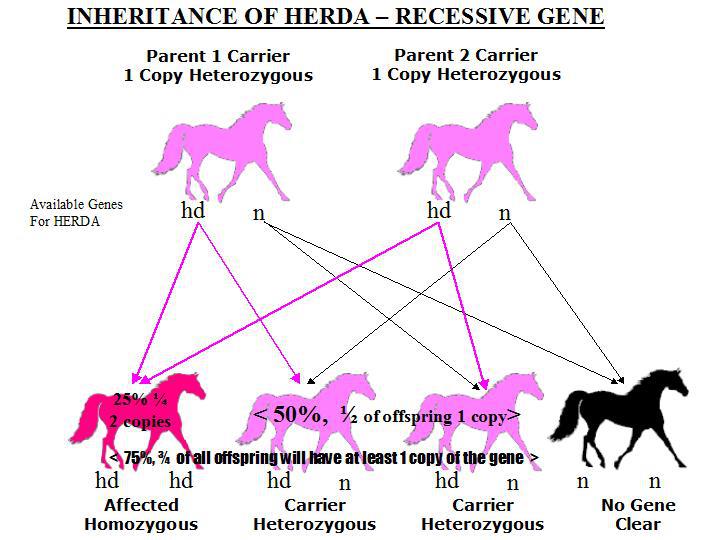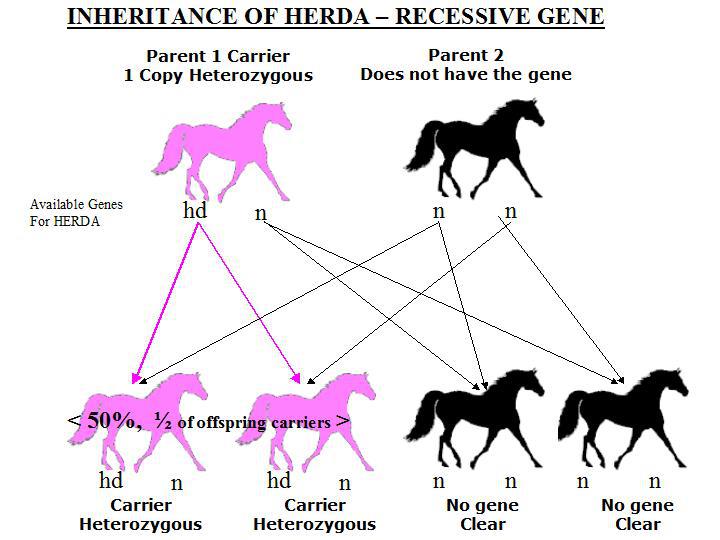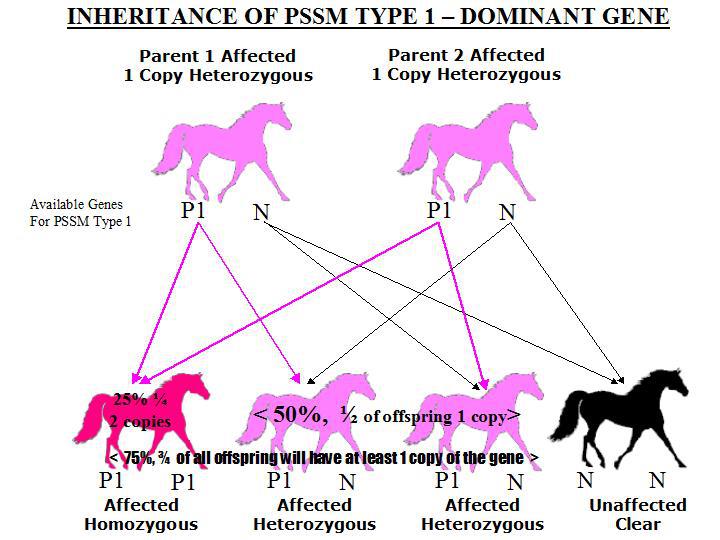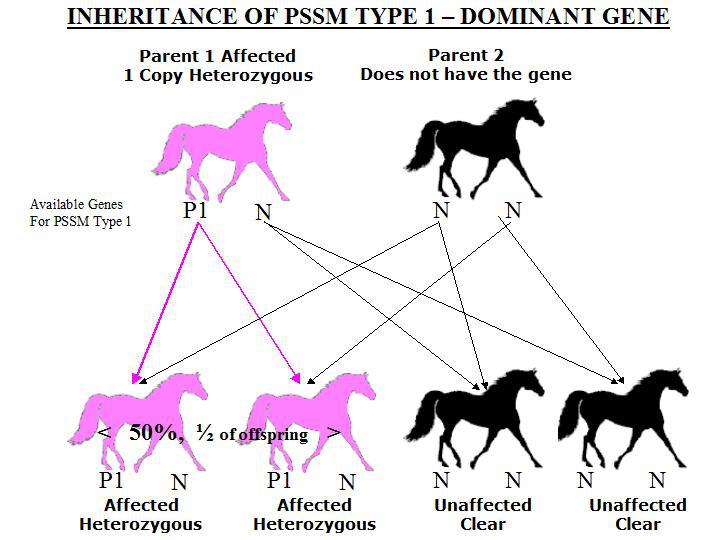HERDA / HC (click title for more details) Test patented by University of California--Davis; 2007/2009
Hereditary equine regional dermal asthenia (HERDA) or hyperelastosis cutis (HC) is an inherited autosomal recessive connective tissue disorder (skin disease). About 4% of all Quarter Horses are carriers (28% in cutting horses) of HERDA which has been genetically linked to POCO BUENO, and his full brother OLD GRANDDAD through both sire and dam. Early on, researchers named Dry Doc, Doc O'Lena, Great Pine, and Zippo Pine Bar as carriers after producing at least one afflicted foal. Horses with a single recessive gene do not express the disorder but have a 50% chance of passing it to their offspring. Horses must have two recessive genes to suffer from this disorder. Breeding two carriers allows for a 25% chance of producing an afflicted offspring with two recessive genes.
GBED (click title for more details) Test patented by University of Minnesota; 2003/2006
Glycogen Branching Enzyme Deficiency is an inherited autosomal recessive disorder which causes late term abortion, stillborn foals, or weak foals with contracted tendons on all four legs with approximately 8% of Quarter Horses as carriers. In all cases, a foal is born lacking the ability to store sugar correctly. Live foals can appear healthy for a short time before becoming weak with elevated respiration and eventually seizures and death as skeletal muscle, heart muscle and the brain tissue die. This disease is genetically linked to the Quarter Horse stallion, KING, and his sire, ZANTANON. Horses with a single recessive gene do not express the disorder but have a 50% chance of passing it to their offspring. Horses must have two recessive genes to suffer from this disorder. Breeding two carriers allows for a 25% chance of producing an afflicted offspring with two recessive genes. See charts above for inheritance example.
HYPP (click title for more details) Test patented by University of Pittsburg; 1992/1994
Hyperkalemic periodic paralysis is an inherited autosomal dominant muscle disease, affecting 1.5% of Quarter Horses (60% of halter horses), that affects the sodium channels in the horse’s muscle and the potassium levels in the blood and has been traced to the stallion, IMPRESSIVE. The disease causes sporadic attacks of muscle contractions and convulsions. These range from mild episodes of involuntary muscle twitching, to a full body collapse and an inability to breathe. It is often confused with seizures or fainting, yet unlike seizures and fainting horses are conscious during HYPP attacks. Things such as a change in feed/supplements or external factors that cause stress can trigger an HYPP attack. Horses with a single dominant gene WILL EXPRESS the disorder AND can pass it to their offspring. Horses with two dominant genes will always produce afflicted offspring. See charts below for inheritance example.
PSSM / EPSM (click title for more details) Test pending by University of Minnesota; 2007/pending
Equine Polysaccharide Storage Myopathy (abbreviated as EPSM outside the stock horse community)
is an inherited autosomal dominant disease resulting in the excess storage of sugar in skeletal muscles, that currently affects 11% of AQHA registered stock. It is often the cause of the common form of tying-up in horses. Affected individuals can have such minor symptoms to go unnoticed or multiple episodes of tying up, to severe colic and recumbency. Two types of PSSM have been identified. Yet, a simple DNA test currently only exists for Type 1. Horses with a single dominant gene WILL EXPRESS the disorder (at some point) AND can pass it to their offspring 50% of the time. Horses with two dominant genes will always produce afflicted offspring. NOTE: Horses on forage based, low carb diets (little to no grain) may NOT exhibit symptoms since the condition is related to sugar storage. For that reason AND the bloodline source(s) is still unknown, this is a "best to test" genetic disease.
MH / EMH (click title for more details) Test pending by University of Minnesota; 2007/pending
Malignant Hyperthermia is an inherited autosomal dominant disease identified in Quarter Horses, Appaloosas and Paints that can cause severe typing up and even death when horses are subjected to anesthesia. A gene mutation causes a dysfunction in skeletal muscles resulting in excessive release of calcium inside the muscle cells. This results in a hypermetabolic state and/or death. Symptoms include fever, excessive sweating, elevated heart rate, irregular heart rhythm, shallow breathing, muscle rigidity, and death. Horses with MH have been linked to two specific bloodlines that have not been publically announced, as of February 2012. Horses with a single dominant gene WILL EXPRESS the disorder (at some point) AND can pass it to their offspring 50% of the time. Horses with two dominant genes will always produce afflicted offspring. See charts above for inheritance example.
Mulberry, Arkansas Ph: (479) 997-8581 Fax: (479) 997-8582
Copyright © Coyote Ridge Ranch LLC All rights reserved. By viewing this site, you agree to the Terms of Use.
(Click on diagrams to enlarge) Used by permission Copyright © Karyn Kay
(Click on diagrams to enlarge) Used by permission Copyright © Karyn Kay
 | ||||
This is a very basic description of the five genetic disorders found in stock horses (Quarter Horses, Paints, Appaloosas, Morgans, etc). All of these disorders are now testable by submitting a hair sample, with root bulbs attached. Since some horse enthusiasts. and even breeders, are unfamiliar with these disorders, we have included the date in which the testing method was discovered and the date of patent issued for each.
Mulberry, Arkansas Ph: (479) 997-8581 EMAIL
Copyright © Coyote Ridge Ranch LLC All rights reserved. By viewing this site, you agree to the Terms of Use.
